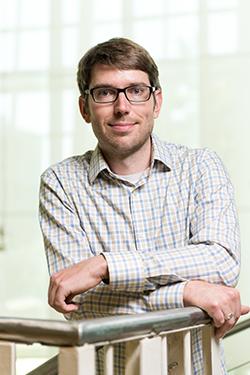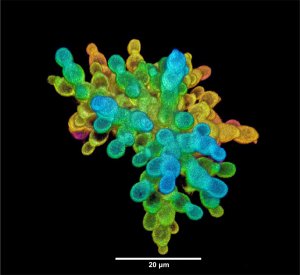event
(Postponed) Exploring The Origin of Multicellular Life by Evolving it, From Scratch, in a Test Tube
Primary tabs
This event has been postponed. Please check back here for updates on a rescheduled date.
The evolution of multicellularity is one of the most significant innovations in the history of life, but it happened so long ago that early steps in this process remain poorly understood. We've taken an unorthodox approach to this problem: rather than study ancient multicellular life, we are evolving it from scratch, leveraging the combined strengths of synthetic biology and directed evolution. In this talk, I will describe our work examining how single cells evolve into simple clumps of cells, and how, over thousands of generations, these early multicellular organisms solve fundamental physical and developmental challenges in surprising and ingenious ways. Our work has helped change the way our field views evolutionary constraints on major transitions like multicellularity, lending direct experimental support to the Jurassic Park school of thought: "Life, uh, finds a way".
About William Croft Ratcliff
William Croft Ratcliff is an evolutionary biologist broadly interested in the evolution of complex life. His Ph.D. training focused on the evolutionary stability of cooperation in the legume-rhizorium symbiosis, where he developed new experimental methods to study how among-organism genetic conflict arises and can be mitigated. A similar evolutionary tension lies at the heart of all key events in the origin of complex life, termed the ‘Major Transitions in Evolution’: namely, how do new organisms arise and evolve to be more complex without succumbing to within-organism conflict? Studying the early evolution of multicellular organisms has been particularly difficult because these transitions occurred deep in the past, and transitional forms have largely lost to extinction. As a postdoc, Ratcliff circumvented this constraint by creating a new approach to study the evolution of multicellularity, evolving it de novo. Since founding the Ratcliff Lab research group at Georgia Tech in 2014, he has combined this approach with mathematical modeling and synthetic biology to examine how simple clumps of cells evolve to be more complex. This research has shown how classical constraints in the origin of multicellularity — e.g., the origin of life cycles, multicellular development, cellular differentiation, and cellular interdependence — can be solved by Darwinian evolution. Ratcliff is an associate professor in the School of Biological Sciences at Georgia Tech, a 2016 Packard Fellowship recipient, and a 2019 NSF CAREER recipient.
About Frontiers in Science Lectures
Lectures in this series are intended to inform, engage, and inspire students, faculty, staff, and the public on developments, breakthroughs, and topics of general interest in the sciences and mathematics. Lecturers tailor their talks for nonexpert audiences.
Join a networking reception in the Clough Commons directly after this talk.
Learn more at cos.gatech.edu
Status
- Workflow status: Published
- Created by: jhunt7
- Created: 02/26/2020
- Modified By: glavigne3
- Modified: 11/12/2020
Categories
Keywords
User Data
Target Audience


